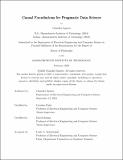| dc.contributor.advisor | Uhler, Caroline | |
| dc.contributor.advisor | Sontag, David | |
| dc.contributor.author | Squires, Chandler | |
| dc.date.accessioned | 2025-03-27T17:00:08Z | |
| dc.date.available | 2025-03-27T17:00:08Z | |
| dc.date.issued | 2025-02 | |
| dc.date.submitted | 2025-03-04T17:25:56.710Z | |
| dc.identifier.uri | https://hdl.handle.net/1721.1/158952 | |
| dc.description.abstract | A key goal of scientific discovery is the acquisition of knowledge that is practically useful for societal endeavors, such as the development of medicine or the design of fruitful economic policies. In this thesis, I place front and center the role that scientific models play in the process of decision-making, emphasizing the importance of causal models in science, i.e., models which describe the possible effects of actions upon a system. The work contained explores central topics in this domain, including causal discovery (learning causal models from data), causal representation learning (learning how to coarse-grain observations into causally sensible “macro-variables”), and end-to-end causal inference (the interplay between causal discovery and downstream decision-making). | |
| dc.publisher | Massachusetts Institute of Technology | |
| dc.rights | In Copyright - Educational Use Permitted | |
| dc.rights | Copyright retained by author(s) | |
| dc.rights.uri | https://rightsstatements.org/page/InC-EDU/1.0/ | |
| dc.title | Causal Foundations for Pragmatic Data Science | |
| dc.type | Thesis | |
| dc.description.degree | Ph.D. | |
| dc.contributor.department | Massachusetts Institute of Technology. Department of Electrical Engineering and Computer Science | |
| dc.identifier.orcid | 0000-0002-1783-2802 | |
| mit.thesis.degree | Doctoral | |
| thesis.degree.name | Doctor of Philosophy | |
